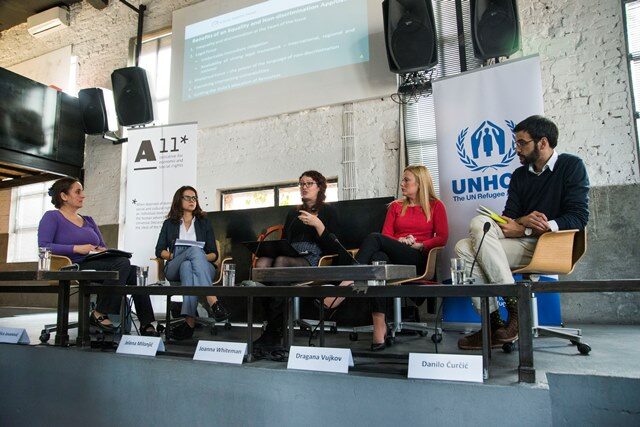Activities
Strategic litigation
Through strategic litigation the A 11 Initiative points out significant legal issues and obstacles in regard to access to socio-economic rights and discrimination and strives to, relying on relevant international standards and examples of good practice from other countries, ensure a more favorable interpretation of law and easier access to economic and social rights for members of vulnerable groups. Examples of our activities in this field include:
- Submission of a constitutional appeal to the Constitutional Court of the Republic of Serbia regarding the discrimination of refugees in tax procedures;
- Complaints filed to the Commissioner for Equality regarding the discrimination of Roma in social and health protection;
- Complaint filed to the Commissioner for the Protection of Equality regarding discrimination of internally displaced pregnant women and mothers;
- Initiative for assessment of the constitutionality of the Law on Financial Support to the Family with Children.

Education and awareness-raising
The A 11 Initiative also contributes to the improvement of the position of vulnerable groups as well as to the realization of its organizational goals via implementation of campaigns and educational programs aimed at awareness-raising and human rights education. Our activities in this field include organizing trainings and workshops on human rights, as well as the School for Economic and Social Rights. This annual educational program addresses various issues related to economic and social rights, such as the place of economic and social rights in the human rights protection framework, States’ obligations to respect, protect and fulfill economic and social rights, and how we might seek protection of these rights in front of judicial and quasi-judicial bodies. The program aims to increase the knowledge about individual rights from the body of economic and social rights and to open discussions about the effects of economic policies on poverty and the realization of aforementioned rights, with special reference to the position of particularly vulnerable groups, focusing particularly on women, persons with disabilities, refugees and asylum seekers.
In previous years, in cooperation with the Faculty of Law of the Union University, the A 11 Initiative organized the Practicum for Economic and Social Rights which aimed to introduce its participants to the basic theoretical tenets on which economic and social rights were based, and their place in the human rights protection system. Besides theoretical issues, the Practicum tackled other issues as well, such as poverty and development, discrimination of minority communities, forced evictions, budgeting policies and austerity measures.
The Initiative also contributes to awareness-raising on the troubles marginalized groups in Serbia face through victim testimonies. Through short films the Initiative aims to illustrate the position of Roma in the job market, the difficulties they face accessing employment and other economic and social rights, as well as the unacceptability and consequences of the criminalization of secondary raw materials collecting.

Public advocacy
The A 11 Initiatives’ recommendations for the improvement of regulations and policies relevant to the protection of human rights are based on analyses of relevant practices and their effect on vulnerable groups. The Initiative identifies deviations from relevant international standards and points out the observed inadequacies to the competent government bodies and institutions, as well as to the wider public. The Initiative uses procedures that are related to Serbia’s membership in international organizations and that are enshrined in relevant international contracts so as to contribute to the alignment of domestic regulations with international standards and the creation of conditions that would allow full access to social and economic rights to all.
Examples of our activities in this field include:
- Recommendation to the High Court of Cassation for the initiation of amendments to the Law on the Protection of the Right to Trial within a Reasonable Time, in the aim of ensuring protection from inefficient conduct of administrative bodies;
- Comments on the Draft Law on Free Legal Aid and participation in the campaign for the withdrawal of the Draft Law on Amendments to the Law on Social Welfare.

Reporting on economic and social rights
Reporting on economic and social rights constitutes an important part of the A11 Initiatives activities. In that avail, the Initiative strives to document cases of economic and social rights violations, but also to provide analyses and recommendations for the improvement of the realization of these rights, especially taking into account the relevant international standards that guarantee them.
You can see our reports in the section Reports.
